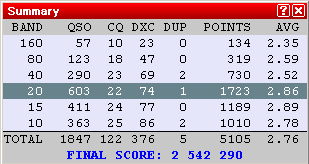Author:
Andrey Fedorov KL1A (RW3AH)
www.CQDX.ru ©
In this article I would like to share my personal experiences on the use of the remotely controlled amateur radio stations. This subject is not new, and was referred to repeatedly in some amateur radio information sources, as well as discussed in many forums on the Internet. So I will not be original here.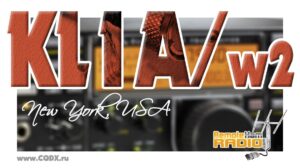
Perhaps one of the pioneers in the field of remote control in amateur radio were W4MQ and W7DXX, who began to conduct various experiments many years ago. By the way, W4MQ Internet Remote Base (HAM Radio Internet Remote Control Pioneer) received the ARRL Technical Innovation Award.
I observed the construction details and configuration of a remote control radio station for the first time on Nodir’s EY8MM WEB site, where he described the setup and configuration of his radio remote control system. Before, that I only saw some short notes in different amateur radio sources.
My own story started at the time when my good HAM friend from Iceland Thor TF4M decided to equip his super station by remotely controlled system and shared the idea with me. We discussed the type of equipment to be used and the principles of construction and project implementation. In order to participate in this project I decided to purchase the RemoteRig «RRC1258mkII” modem for further TF4M’s station tests.In spring of 2012, Thor received the necessary equipment. Later that summer I also received the same equipment from Sweden to start testing the remote.
For a couple of weeks, Thor was “conjuring” his super station setup to get it linked to the Internet and to start project implementation. With the help of the radio amateurs from Sweden he gradually began to install hardware according to the configuration developed earlier. At the beginning the results were not great primarily because of the relatively weak internet channel. From my side, I connected my modem device and fine tuned it. In order to do so, it was necessary to keep in mind many factors including the configuration of the communication equipment and antenna switching. So it took quite a long time to achieve the desired result. I didn’t have any experience before with such a technology so I used common sense while working on this project.
The basic Thor’s Setup was as follows:
– Two RemoteRig “RRC1258mkII” Modems.
– The Elecraft “K3/Twin” (later Thor got Elecraft K3/0 which was designed specifically for radio station remote control).
-Antennas relay switches
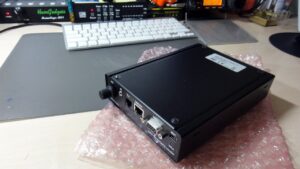 My new RRC1258mkII Control Unit from RemoteRig.com (Photo by KL1A)
My new RRC1258mkII Control Unit from RemoteRig.com (Photo by KL1A)
My first Remote Radio QSO was held on July 4, 2012 with callsign TF/KL1A.
* I will not discuss about legal aspects of the remote radio station control in this article. I can only say from the outset that Thor paid attention to strict adherence to the Rules and Radio Regulations. He has investigated very carefully the legal aspects of our operations to make sure we did not violate any law.
When the first part of the project was successfully implemented, even at the lowest Internet speed connection, we started the second part of it. It was about configuration and complete control of the station using the transceiver ELECRAFT “K3/0.” The difficulty was to fine tune settings of both transceiver and modem. Weak internet channel added to the difficulty of the task. Second testing of the project was performed on August 12, 2012 with the call sign TF4M/KL1A. As a result, 220 QSO were conducted in a time frame of less than one hour.
New «Remote Control Ham Radio (RHR) Cluster» Project
At various stages of the project we continued to consult with HAM’s. We shared ideas and discussed the details. Among HAMs helping us were two wonderful persons from the USA who were obsessed with the same idea, Ray W2RE and Lee WW2DX. The guys were working on same issue but at more serious business level, and they were looking for someone who could have performed beta testing for them. I offered my help and was testing their project during the next 6 months.
Their energy and enthusiasm is amazing, constantly at work implementing new ideas, solutions and pushing forward. New solutions were immediately implemented and put into practice. This speed has always fascinated me.
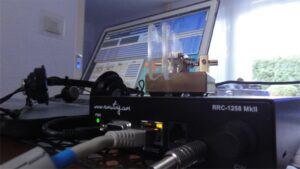 KL1A/W2 modest Remote Setup (Photo by KL1A)
KL1A/W2 modest Remote Setup (Photo by KL1A)
How it looks
Below I would like to focus on the description of the W2RE & WW2DX stations. Here, perhaps, the term «Remote Control Ham Radio (RHR) Cluster» is used for the first time and I would like to claim Copyright ?
The flagship of the «Remote Control Ham Radio (RHR) Cluster» is W2RE Big Gun Contest station:
W2RE Big Gun Contest Station (Photo by W2RE)
Here are the station descriptions from their website:
QTH: Summit, NY.USA.
Nestled at 2100ASL in the Northern Catskill Mountains, this Contest QTH currently has 24 antennas including the following:
Elecraft K3 with Expert 1KFA 1KW Amplifier and 4 Towers
• 6m – 5 element Yagi
• 10m – 5/5/5 Stacks + 7 Element Mono bander @ 100?
• 15m – 5/5/5 Stacks
• 20m – 4/4 Stacks + 5 Element Mono bander @ 100?
• 40m – 3 ele 40M yagi
•
80m – Full size 4 Square
• 160m – 3 Sloper EU/SA/JA – 4 Square being built
• WARC – Dipole @ 100?
This QTH will provide you with 1KW output on all bands 6-160m. This QTH has drastic drop offs in all directions. One of the biggest advantages of this QTH is the non-existent noise floor! This QTH has already set records and won CQWW and ARRLDX contests.
Other «Remote Control Ham Radio Cluster» stations:
QTH: Blueberry Hill NY. USA.
Located in the Hudson Valley, this QTH is at 1200ASL with drastic drop offs to JA and SA and beautiful takeoff angles in all other directions. This QTH has won #1 US ARRL and CQWW contests and consists of the following equipment:
Elecraft K3 with Expert 1KFA 1KW Amplifier
• 6-20m – 4 element SteppIR with 6 elements on 6m.
• 40m – 2 element F12 Magnum 240
• 80m – INV V – 4 Square in Spring
• 160m – Inverted L
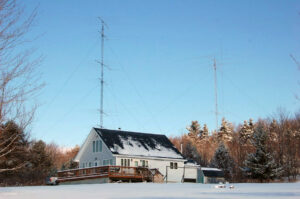
QTH: Windham Mountain, NY. USA.
Located in the Catskill Mountains, this QTH is at 1800ASL with drastic drop offs to JA and EU. This QTH hits the very LOW angles as the terrain drops off 1500? in less than a mile.
Elecraft K3 with Expert 1K-FA 1.2KW Amplifier
• 6m – 6 Element HyGain
• 10-20m – Force 12 Yagi + WARC.
• 30m – High Dipole
• 40m – 2 element F12 Magnum 240
• 80m – 1/4 Wave Full Size Vertical
• 160m – Inverted L
QTH: QUAKERHILL, NY. USA.
Located in Southern Dutchess County NY, this QTH has beautiful take off to EU and SA.
Elecraft K3 with Elecraft KPA500 Amplifier
• 6m – M2 6M7 @ 77?
• 10m – 4 Full Size Elements 2X Arrays 2/2/4 WRTC Antenna @ 73?
• 15m – 2 Full Size Elements 2X Arrays 2/2/4 WRTC Antenna @ 73?
• 20m – 2 Full Size Elements 2X Arrays 2/2/4 WRTC Antenna @ 73?
• 40m – Cushcraft 40-2CD 2 Element Yagi @ 85?
• 80m – 4 Square in a swamp
• 160m – INV L also in a swamp
The team is currently working on fifth «Remote Control Ham Radio (RHR) Cluster» site as well as three other sites along the Eastern seaboard.
It is impossible for one person to build a network of stations of this level. This type of project would require a team of enthusiasts obsessed and completely dedicated to the idea. The expenses were beyond imagination. On top of the expenses, team efforts should be acknowledged. I have worked from various US Contest Stations before (K1LZ and K1TTT), but the results achieved while working from this Super stations ‘cluster’ were really amazing.
Dream Team
Remote Ham Radio was founded by Ray Higgins (W2RE) and Lee Imber (WW2DX) in 2012. Before RHR Ray and Lee owned and operated Hudson Valley towers, Inc. a tower and antenna installation and service company that built and maintained over 75 tower and antenna installations in the Northeastern United States. In the commercial sector they have done contract work for government agencies NASA and The Department of Homeland Security.
Ray W2RE has years of experience building, maintaining and designing winning contest stations. Lee WW2DX has experience in design, development and engineering new leading edge network and infrastructure technology. Their experienced team has brought Station Remote to the next level.
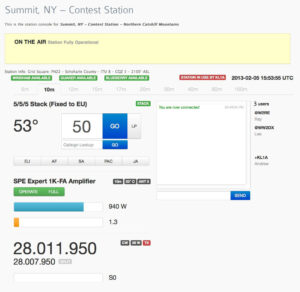 WEB RHR console was designed and developed by WW1X and WW2DX
WEB RHR console was designed and developed by WW1X and WW2DX
The proprietary web console was designed and developed by the RHR team, WW1X and WW2DX to provide the best remote ham experience in the world. There is simply nothing like it. Countless hours of coding, testing, design and experimentation has produced one of the most elegant operating experiences in the world.
Right Choice
Daily discussions of configuration issues over Skype quickly yielded in positive results. After a couple of weeks I was able to work on HF despite the distance between me and Remote site of more than 6000km. The configuration was very similar to that of Thor TF4M. Based on the previous Elecraft K3 settings, it was easy to reconfigure the RRC modem for the new project. Some additional tweaks and basic configuration was also done.
It was especially difficult to achieve stable system operation in CW Mode.
Any small failure on the Internet distorted the quality of the transmitted signal. Sometimes, CW was just unrecognizable. It took about two weeks to adjust CW. I have used a slightly different method of manipulation in CW Mode (my ‘Know-How’). With the new configurations CW operation is now perfect as you will read below during CQWWCW.
In addition, I have tried different types of CAT Applications. It was not difficult to make basic configuration based on two ELECRAFT “K3” transceivers , but it was much more complicated to manage mixed type configuration i.e. Application – Internet – K3, In addition, applications are usually based on the traditional operating system such as «Windows», but very few HAMs use a configuration under Mac OSX, which I was working in.
I would like to stress that during the project for the first time Lee WW2DX and I managed to connect Mac OSX and “RRC1258mkII” Modem without connecting to the Internet through a cable. Connection has been done by Wi-Fi.
CAT and Applications
Perhaps the best solution allowing to participate in such project with the MAC under OSX is the DX logging software «RUMlog». It’s freeware Application, powerful and allowing to write scripts to control the transceiver remotely. It is also possible to write CW macros. Not an ideal solution, but it is better then nothing.
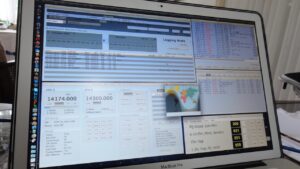 “RUMLog” Application on MAC Book Pro under OSX (Photo by KL1A)
“RUMLog” Application on MAC Book Pro under OSX (Photo by KL1A)
Being on a trip to the South of Germany, I have tested my Mac OSX / RUMlog + RRC1258mkII with unstable Internet connection via LAN-Repeater. I made a few hundred QSO’s during this test. SSB signal quality was very decent, but CW sometimes had small problems with the quality. But for such a poor internet connection this can be neglected.
The next stage of the project was the testing of the configuration with N1MM Log and CAT Controlling Application – “TRX-manager” under Windows OS (Windows-XP). I didn’t have any problems with this configuration.
The best solution for the Remote Control in my case was N4PY CAT Controlling Application. I would like to express my special thanks to Thor TF4M and to Carl N4PY for help in purchasing and using this very nice Application.
For me, N4PY program was optimal in configuration with LogiTech Mouse, SONY VAIO under “Windows-XP”, and Log «Win-Test». I was able to make more than 16,000 QSO via remote control using my call sign KL1A/W2. First in Germany then in Austria and again at the end of the project in Egypt.
Daily operation of W2RE / WW2DX “Remote Ham Radio (RHR) Cluster” showed that the system is stable, flexible and robust.
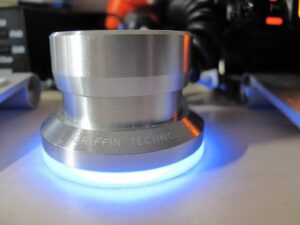 From time to time I used the Griffin PowerMate 3D Mouse. Very usefull for CAT Remote Control. (Photo by KL1A)
From time to time I used the Griffin PowerMate 3D Mouse. Very usefull for CAT Remote Control. (Photo by KL1A)
In the Contest
«CQWWDX» CW Contest 2012 was certainly a particular challenge for the entire system. Perhaps it was the most dramatic moment during the whole project.
The most interesting fact was that during the «CQWWDX» 2012 in CW there was nobody working from Zone-34. The huge territory was not represented at all. Although I was physically stationed in Zone-34, I used W2RE / WW2DX Stations located in about 8000km away from me. I came to Egypt and installed my small RHR Setup. It included VAIO notebook, RRC Modem, Heil Proset headset, keyer and Power Supply. Internet Connection was provided by “Vodafone” by G3 USB Stick.
Participation in this Contest was unexpected for me. I did not plan on working in the Contest seriously and decided to only test the equipment at the RHR Blueberry Hill station. After about an hour of the Contest I went deep into the process and got carried away. Only after the competition was over did I realize that all the connections were carried out through the equipment located thousands of kilometers away. I did not feel this distance whatsoever, as if all the equipment was here, in my shack.
There were some surprises during the Contest when, for example, I was able to break a Pile-Up calling RI1ANF on the 160m. The Big Guns i.e. K3LR, K1LZ and even the W2RE M/S (SUMMIT) team were behind me. It was really amazing and unexpected.
In the entire time I operated the contest there was only one DX station I could not work – JT5DX on 40m. My remote 2 el. Yagi, apparently, was not enough for such a long path QSO.
Overall, the Contest left me in a very positive mood.
I worked in a new and exotic category in this Contest called the”Extreme category”. This category promotes technology in contesting. You can read more about it here: http://bit.ly/UUXjhs
My final claimed score: 1847 QSO (2.542.290 Points). That’s not bad for the Remote Control Station in the distance of about 8000km with a poor internet connection with ~400ms latency.
DX never sleeps
Part of the project included working with the DX stations. Operating with “TRX-Manager” or N4PY Applications is somewhat different from Elecraft “K3/0”, especially in case of “Split” operation. Sometimes it was difficult to recognize which frequency the DX station was listening. Manipulations with “Split” buttons were not easy and needed time. Nevertheless, after some exercise this problem can be ignored.
Below are examples of my 2012 DX achievements during the ‘beta’ testing of W2RE/WW2DX «Remote Control Ham Radio (RHR) Cluster»:
ZL9HR :
SSB 10 / 12 / 15 / 17 / 20 / 40
CW 10 / 12 / 15 / 17 / 20 / 30 / 40
VU7M :
CW 20
PT0S :
SSB 10 / 12 / 15 / 17 / 20 / 40 / 80
CW 10 / 12 / 15 / 17 / 20 / 30 / 40 / 80 / 160
CY9M :
SSB 40
CW 20 / 80
NH8S :
SSB 10 / 15 / 17 / 20 / 40 / 80
CW 12 / 15 / 17 / 20 / 30 / 40 / 80 / 160
5T0SP :
SSB 10 / 12 / 15 / 17 / 40 / 80
CW 15 / 17 / 40 / 80
Some positive aspects of working remotely (From RHR website)
Any General/Advanced/Extra Class licensed U.S. Amateur Radio Operator that may like to do one or more of the following
• Operate from a HOA restricted area.
• Operate from an apartment building.
• Experience “running” DX from the East Coast.
• Extend your DXing/Contesting Toolbox
• Open and close the bands
• Experience operating from one of the largest contest stations in the U.S.
• Operate from 2100?ASL with big stacks.
• Listen and test your station using a remote transceiver.
• Operate stacks, 80m and 160m 4 squares,
• Don’t want the expense of a tower installation.
• Don’t want the expense of a maintaining a station.
• Can take your shack with you (portable)
• You have more than one station to operate from!
• Keep the XYL happy!
Remote Control Ham Radio (RHR) Cluster © has been successfully running since October 2012.
My final results from operating remote for 6 months: 210 DXCC and 16076 QSO with almost completing 5B DXCC (-10 DXCC on 80m Band).
Conclusion
My special thanks to Thor TF4M, Ray W2RE and Lee WW2DX for this unique opportunity to be a member of their ambitious projects. It was really an exciting and unforgettable time in my HAM life.
Thanks to: WW1X, N4PY, N1MM, F5MZN, F6FVY, F6DEX, DL2RUM and to all who have helped throughout the project in its ultimate realization.
Thanks so much also to all radio amateurs who caused and who held all unforgettable QSO’s from all over the world! All these QSO’s (TF/KL1A, TF4M/KL1A, KL1A/2 and KL1A/W2) do not count for DXCC but they do count for the true spirit of Amateur Radio trough state of the art technology and its applications.
References
TF4M : www.TF4M.com
Remote Ham Radio : www.remotehamradio.com
Sparky’ Blog : www.CQDX.ru
EY8MM : www.ey8mm.com/articles/153-remote-control-of-hf-radio?catid=13%3A2010
ARRL : www.arrl.org
RemoteRig : www.remoterig.com
*If you need to learn more about the legal issues of the Remote Station Control, I suggest to read the article on Thor’s WEB site:
1) Transnational Remote Operation:
http://tf4m.com/tfkl1a-remote-
2) The legal aspects of remote radio station control https://www.cqdx.ru/ham/ham_radio/the-legal-aspects-of-remote-radio-station-control/

